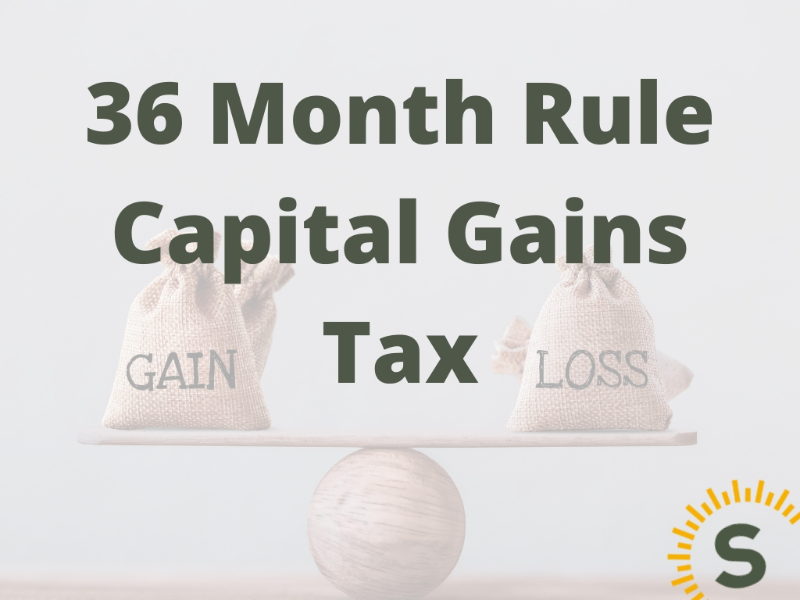
If you've recently sold a property in the UK, you may have encountered the term '36-month rule capital gains tax'...
This important rule controls how taxes work when you buy or sell property.
It might seem confusing at first, but don't be afraid, this insight is here to make it easy for you to understand and deal with property taxes.
The 36-month rule is a UK tax law that affects how much capital gains tax (CGT) you owe when you sell a property within a certain time. Basically, if you sell a property within 36 months of buying it, you might have to pay CGT.
The main goal of this rule is to stop people from avoiding taxes by quickly buying and selling properties. However, there are some special cases where this rule doesn't apply.
Knowing these exceptions can help property owners handle their taxes better and make smarter investment choices.
The 36-month rule, which used to be a 36-month exemption period before selling a property, has changed.
Now, for most property sales, this period is shorter. When you sell a property, you'll pay tax on the profit you make from the sale, known as the 'chargeable gain.' This rule was updated as of May 12, 2023.
Often called the 'three-year rule,' the rule is about how much tax you pay when you sell a property within three years of buying it.
This rule applies to different types of properties like homes, rental properties, business places, and land. The 36-month rule is a UK tax law that affects how much capital gains tax (CGT) you owe when you sell a property within a certain time.
Basically, if you sell a property within 36 months of buying it, you might have to pay CGT.
But it's important to know that this rule has changed. It used to be a 36-month window, but now, for most property sales, it's a shorter nine-month period where you may be exempt from CGT.
The 36-month rule for capital gains tax affects many types of properties. It's particularly important when it comes to homes because selling your main residence within the set time can lead to owing capital gains tax.
However, property owners have options to lower or even eliminate this tax by using certain exemptions and tax breaks.
In the United Kingdom, you can generally avoid paying capital gains tax (CGT) on the sale of a property if it has been your main residence for the entire time you owned it.
This is often referred to as Private Residence Relief (PRR).
There's no specific minimum time requirement mentioned in tax legislation.
However, it's important to note that the rules around PRR can be complex, and there are some situations where you might not qualify for the full relief, such as if you have used the property for business purposes or if it's a very large property with extensive grounds.
The 36-month rule doesn't apply to everyone and everything. There are exceptions and ways to reduce the tax you owe. Two important ones are Private Residence Relief (PRR) and Letting Relief, which can help lower your capital gains tax (CGT) bill.
Private Residence Relief (PRR) is a special exemption within the 36-month rule. It can greatly reduce or even wipe out the capital gains tax you owe when selling a property that you've called your main home.
Remember, the property must have genuinely been your primary residence during your ownership to qualify for this relief.
Letting relief is another important exemption in the 36-month rule. It's meant to ease the capital gains tax (CGT) for people who have rented out a portion of their main home.
The amount of relief you get depends on how long you've rented out part of your property and the portion of the property you've rented.
Apart from PRR and Letting Relief, there are more exemptions to consider. If you're involved in furnished holiday lettings (FHL), you may qualify for exemptions like Entrepreneurs Relief and capital allowances.
Additionally, there are specific reliefs for disabled individuals and care homes to provide support for people with disabilities and those offering important care services.
The 36-month rule for capital gains tax has a big influence on property owners and investors in the UK.
It sets the rules for how capital gains tax works when you buy and sell properties, and it affects the decisions you make about managing and reducing your tax responsibilities.
The 36-month rule has a major impact on how much capital gains tax you pay when dealing with properties.
To figure out this tax, you look at the difference between the selling price and the initial cost, while considering allowable expenses and any reliefs or exemptions that might apply.
Property owners must correctly calculate and report their profits or losses within the specified timeframe to follow the 36-month rule and CGT rules.
Not doing this can result in penalties and legal issues.
Because of the tax impact of the 36-month rule, it's important to come up with plans to handle and improve your tax responsibilities.
These plans might involve choosing the right timing for property transactions, making use of any exemptions or reliefs you qualify for, and getting advice from experts like tax specialists or accountants who specialise in property deals.
Staying informed about updates to the 36-month rule and CGT regulations is crucial for property owners and investors.
It helps you stay on top of the latest rules, meet reporting obligations, use tax strategies effectively, and adapt to any changes, all of which can greatly improve your tax situation.
Property ownership in the UK comes with a host of responsibilities, one of which is understanding and managing tax obligations.
Property owners should keep thorough and precise records and paperwork to handle property deals and adhere to tax rules properly.
These records should include information about when you bought the property, any improvements made, all expenses with receipts, and income and expenses related to rentals if applicable.
Seeking professional advice from tax experts or accountants specialising in property transactions is a prudent strategy for property owners.
These professionals can assist with various aspects of tax planning, including determining eligibility for exemptions and reliefs, calculating capital gains tax, and providing guidance on reporting requirements.
Strategic planning and careful timing of property transactions can significantly impact tax liabilities.
To maximise exemptions and reliefs, property owners should plan property transactions strategically, spread transactions over multiple tax years, and consider offsetting losses against other gains to reduce overall tax liabilities.
Tax regulations and policies can evolve over time, making it essential for property owners to stay informed about any changes.
Checking official government websites, subscribing to reliable tax news sources, and engaging in professional networks can help stay updated with the latest tax regulations.
Private Residence Relief (PPR) applies when you sell a "dwelling house" that has been your only or main home. A "dwelling house" usually means the whole building where you live and any connected buildings that are part of your home.
This relief also covers the gardens and grounds within a certain allowed area, typically less than 5,000 square meters.
You'll be exempt from Capital Gains Tax when selling your home if you meet certain criteria. However, if you do not qualify for full PRR, you may still be entitled to partial relief.
To be eligible for full PRR, the property must be your only home, you should have lived in it as your main home for all the time you've owned it, and you must not have used any part of your home exclusively for business purposes.
If you do not meet all the conditions for full PRR, you may still be entitled to partial relief. This is determined by filling out the appropriate CGT tax return summary pages.
The 36-month rule capital gains tax is a vital regulation in the UK that governs the tax implications of property transactions. By understanding this rule and employing the tips and guidance provided, property owners can confidently navigate the complexities of property transactions, optimise tax liabilities, make informed decisions, and achieve their financial goals.
So, whether you're selling your primary residence or a second home, remember to consider the 36-month rule and its many intricacies to ensure you make the most of your property investment
Inherited properties or gifts are subject to the same 36-month rule. The countdown begins from the date the deceased acquired the property, or from the date of the gift. However, certain reliefs may apply depending on the circumstances.
The 36-month rule primarily concerns capital gains tax (CGT) and operates independently of stamp duty and inheritance tax. However, understanding all applicable taxes is crucial for comprehensive financial planning when dealing with property transactions.
Evidence may include residency records, utility bills, council tax statements, and rental agreements. Documentation proving periods of occupancy versus rental use is essential for substantiating claims for exemptions like PRR or Letting Relief.

Stuart is an expert in Property, Money, Banking & Finance, having worked in retail and investment banking for 10+ years before founding Sunny Avenue. Stuart has spent his career studying finance. He holds qualifications in financial studies, mortgage advice & practice, banking operations, dealing & financial markets, derivatives, securities & investments.





Our website offers information about financial products such as investing, savings, equity release, mortgages, and insurance. None of the information on Sunny Avenue constitutes personal advice. Sunny Avenue does not offer any of these services directly and we only act as a directory service to connect you to the experts. If you require further information to proceed you will need to request advice, for example from the financial advisers listed. If you decide to invest, read the important investment notes provided first, decide how to proceed on your own basis, and remember that investments can go up and down in value, so you could get back less than you put in.
Think carefully before securing debts against your home. A mortgage is a loan secured on your home, which you could lose if you do not keep up your mortgage payments. Check that any mortgage will meet your needs if you want to move or sell your home or you want your family to inherit it. If you are in any doubt, seek independent advice.